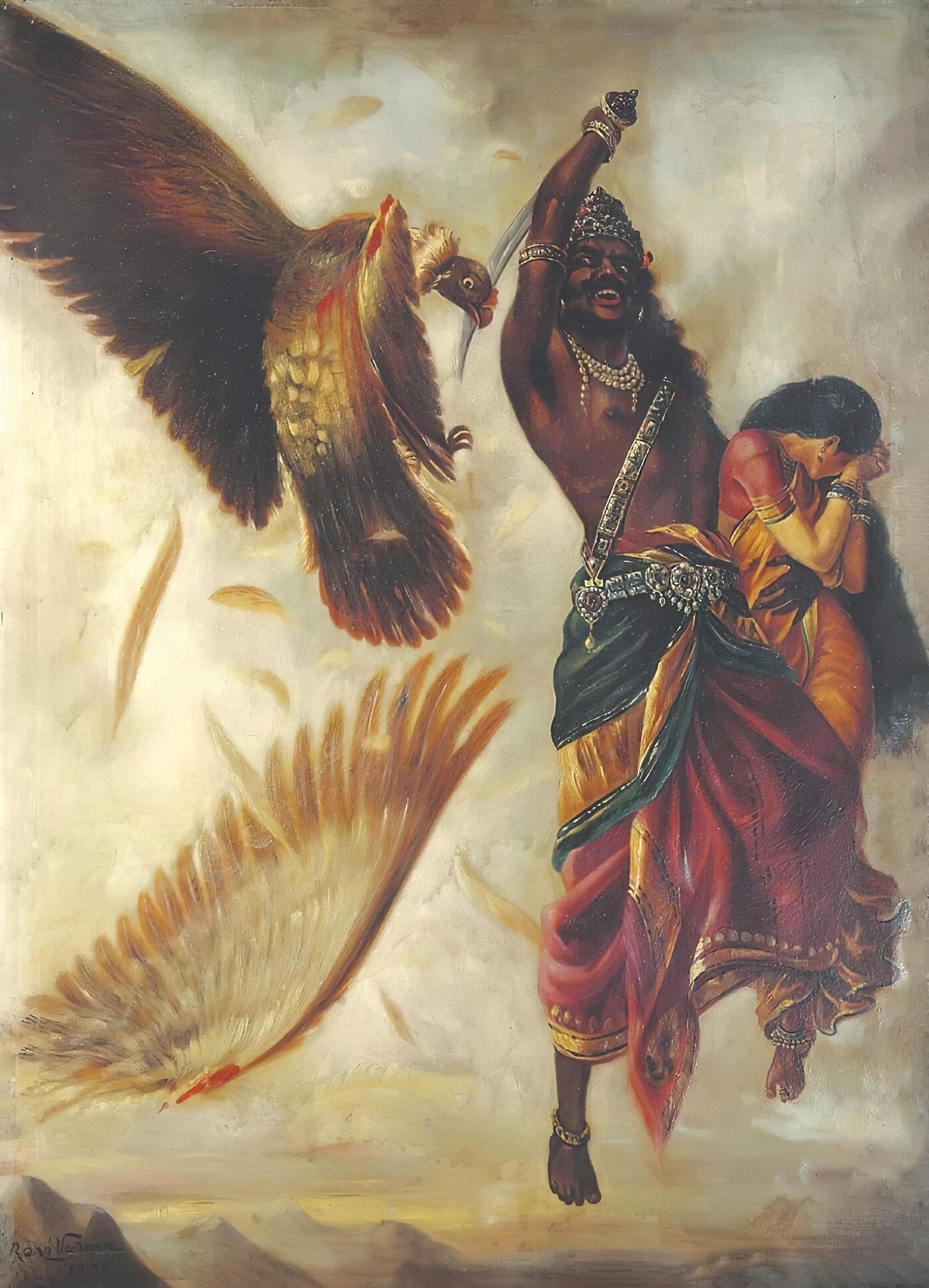The true meaning of victory and defeat
In material life, victory or loss is determined by one's capacity to obtain victory over enemies and secure positions or properties. In spiritual life things are different.
In material life, victory or loss is determined by one's capacity to obtain victory over enemies and secure positions or properties. If one is capable of defeating his enemy and obtaining what he desires one is considered victorious, and if one loses he is considered defeated. Under this principle people always fight in material life, be it with weapons or words, and because of this constant fight, there is always enmity and enviousness.
In the transcendental platform, however, things work differently. A good example is the story of Jatayu.
Jatayu was a vulture who was a devotee of Lord Rama and was living close to him when he was in the forest. When Ravana kidnapped Sita, Jatayu was the first to see him flying with her in the chariot. Although Ravana was the most powerful demon of his time, protected by the blessings of Lord Shiva, Jatayu couldn't tolerate Ravana taking Sita and decided to fight Him, although the chances of victory were nill.
One under material consciousness could accuse Jatayu of being a fool. He knew he couldn't defeat Ravana and, by material calculation, his death was in vain, since he just lost his life without defeating his enemy. However, when we analyze things from the spiritual perspective, things are different.
First of all, Jatayu was not a jñani, but a bhakta. Jñanis act based on logic, but bhaktas act to please the Lord. Although Jatayu knew Ravana was powerful, he understood how Sita was important to Lord Rama, and thus he could not stand still, even though the enemy was extraordinarily powerful. He attacked Ravana not out of logic, but out of love for Lord Rama, understanding how Sita was important for Him.
Predictably, Ravana defeated Jatayu, cutting his wing using his sword. Jatayu fell to the ground, and although mortally wounded he was able to preserve his life for some time, understanding that he had a last duty to perform: convey to Lord Rama the information that Ravana had kidnapped Sita and tell him the direction he took her.
Although from the material point of view Jatayu was defeated, he achieved the ultimate victory, obtaining the mercy of Lord Rama. The Lord felt so indebted to Jatayu for his service that he invoked all the holy rivers by shooting an arrow to the ground, creating Thirtaraja, a pound from where Jatayu could drink water. After he passed away, Lord Rama personally performed his funeral ceremony.
For a devotee, victory doesn't mean achieving victory over an enemy, but simply acting in a way that satisfies the Lord. Equipped with this knowledge, he is able to take risks when necessary to please Krsna. A devotee understands that victory and defeat are ultimately in the hands of Krsna, and someone who is empowered by Him can perform any kind of miraculous task. Militarily speaking, the Pandavas had very little chance of being victorious in the battle of Kuruksetra, but because that was Krsna's desire, they defeated the Kauravas. Similarly, when Srila Prabhupada came to the West, he seemed to have little chance of successfully establishing Krsna Consciousness there, but still by the grace of Krsna he was extraordinarily successful.
There are cases of devotees who lost their lives while performing their services, like in the case of Jatayu, but they are not less victorious. The proof of that is that they achieve the same destination. In the transcendental platform, so-called victory and defeat are the same, and thus one who loses his life while performing his service is not less glorious than someone who prevails.
In the end, everyone has to meet death. Therefore, by material calculation, no one can be victorious in this world. However, a devotee is intelligent enough to be able to sacrifice his temporary material comfort and take risks in the service of the Lord, achieving ultimate victory, just like Jatayu.
Srila Prabhupada comments about this point in a lecture on SB 7.9.9 from 01/03/1977:
"Jaṭāyu was a bird. So how they satisfied? The Jaṭāyu fought with Rāvaṇa. Yesterday you saw. Rāvaṇa was kidnapping Sītā devi, and Jaṭāyu, the bird, he was going, flying. Rāvaṇa knew how to fly without machine. He was very, very materially powerful. So the Jaṭāyu attacked him on the sky: "Who are you? You are taking away Sītā. I shall fight you." So Rāvaṇa was very powerful. He was defeated, Jaṭāyu, but he fought. That is his service. Never mind defeated. Similarly, we have to fight. Those who are opposing Kṛṣṇa consciousness movement, we have to fight with them to our best capacity. Never mind if we are defeated. That is also service. Kṛṣṇa sees the service. Defeated or victorious, depend on Kṛṣṇa. But fighting must be there. Karmaṇy evādhikāras te mā phaleṣu kadācana. That is the meaning. You have to work for Kṛṣṇa sincerely, intelligently, and victory or defeat, it doesn't matter. Just like Jaṭāyu was defeated fighting with Rāvaṇa. His wings were cut off. Rāvaṇa was very strong. And Lord Rāmacandra, He did his last funeral ceremonies because he was a devotee. This is the process, not that we have to learn something extra. Whatever capacity we have got, let us decide to render service to the Lord. It doesn't require that you must be very rich or very beautiful, very bodily strong. Nothing of the sort. Sa vai puṁsāṁ paro dharmo yato bhaktir adhokṣaje ahaituky apratihatā (SB 1.2.6). In any condition, your devotional service should not be stopped. That should be the principle, that we are not going to stop, any circumstance."



